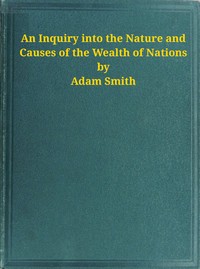An Inquiry into the Nature and Causes of the Wealth of Nations by Adam Smith
"An Inquiry into the Nature and Causes of the Wealth of Nations" by Adam Smith is a foundational work in economic theory, written during the late 18th century. This treatise examines the fundamental principles that lead to a nation's wealth, focusing on aspects like labor productivity, the effects of the division of labor, capital accumulation, and the roles that government and commerce play in economic development. At the start of the text,
Smith outlines the central themes and structure of his inquiry, emphasizing the crucial relationship between labor and the wealth generated in a society. He argues that the productive powers of labor can be significantly improved through its division, which allows individuals to specialize in particular skills, ultimately leading to increased efficiency and output. Smith illustrates this concept through practical examples, such as the pin-making industry, where the division of labor leads to a drastic increase in production capacity. The opening chapters set the stage for a comprehensive exploration of economic principles, laying a foundation for readers to understand the relevant mechanics that drive economic prosperity. (This is an automatically generated summary.)
Read now or download (free!)
| Choose how to read this book | Url | Size | ||||
|---|---|---|---|---|---|---|
| Read online (web) | https://www.gutenberg.org/ebooks/3300.html.images | 2.2 MB | ||||
| EPUB3 (E-readers incl. Send-to-Kindle) | https://www.gutenberg.org/ebooks/3300.epub3.images | 930 kB | ||||
| EPUB (no images, older E-readers) | https://www.gutenberg.org/ebooks/3300.epub.noimages | 952 kB | ||||
| Kindle | https://www.gutenberg.org/ebooks/3300.kf8.images | 2.1 MB | ||||
| older Kindles | https://www.gutenberg.org/ebooks/3300.kindle.images | 2.0 MB | ||||
| Plain Text UTF-8 | https://www.gutenberg.org/ebooks/3300.txt.utf-8 | 2.4 MB | ||||
| Download HTML (zip) | https://www.gutenberg.org/cache/epub/3300/pg3300-h.zip | 1.7 MB | ||||
| There may be more files related to this item. | ||||||
Similar Books
About this eBook
| Author | Smith, Adam, 1723-1790 |
|---|---|
| Title | An Inquiry into the Nature and Causes of the Wealth of Nations |
| Note | Reading ease score: 47.4 (College-level). Difficult to read. |
| Note | Also known as: Wealth of Nations |
| Note | Wikipedia page about this book: https://en.wikipedia.org/wiki/The_Wealth_of_Nations |
| Credits | Credits: Colin Muir and David Widger |
| Language | English |
| LoC Class | HB: Social sciences: Economic theory, Demography |
| Subject | Economics |
| Category | Text |
| EBook-No. | 3300 |
| Release Date | Jun 1, 2002 |
| Most Recently Updated | Jul 11, 2024 |
| Copyright Status | Public domain in the USA. |
| Downloads | 9651 downloads in the last 30 days. |
| Project Gutenberg eBooks are always free! | |

